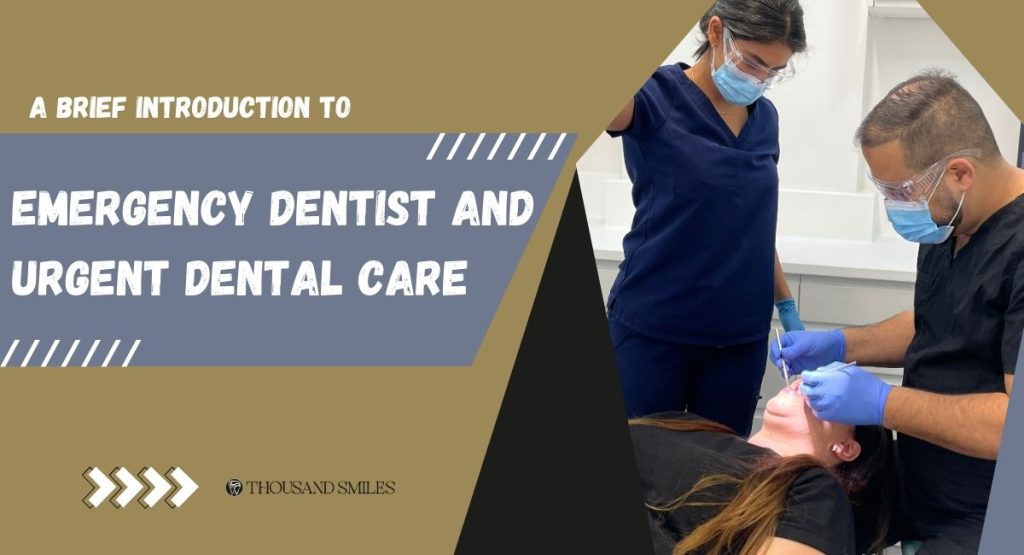|
Getting your Trinity Audio player ready...
|
Understanding the basics of dental emergency
Any problem related to the overall mouth or the oral health that requires immediate attention and intervention of a dentist is a dental emergency. It is important to remember that every problem related to the teeth and the mouth is not an emergency. Few typical examples of dental emergency include uncontrolled bleeding from the mouth that does not seem to stop, unbearable pain that does not ease away even with medications and broken or fractured bones in the face, etc.
What you should do in a dental emergency
If you are experiencing a condition that fits the description of a dental emergency, you should first get in touch with your dentist without any delay. Explain your problem in few words and seek further instructions. Usually dentists in the UK have an emergency number and if your dental emergency problem arises beyond normal working hours, in that case it is better to call at the emergency number. But what if you do not have a dentist? In that case you have two options – either walk straight into the ER of the nearest hospital or go to an urgent care centre to seek proper care and treatment explains an emergency dentist in London. Note that dentists usually handle the majority of dental emergency cases in their offices. But when serious injuries are concerned – like broken or fractured facial bones –you should better go straight into the ER of the nearest hospital.
You should consider the following typical conditions as dental emergencies:
Typical examples of dental emergency include the following –
- Severe pain in the tooth
- A tooth that is badly cracked
- A completely knocked out tooth
- A tooth that is partially dislodged (in dental terms it is called extruded tooth)
- When any dental restoration is lost of suffers breakage
- Severe injuries to the soft tissues in the mouth like a deeply cut ot busted lip
- Dental abscess that results in swelling of the jaw and the face
In the following sections of the blog post let us discuss what you should do in some of the dental emergency conditions mentioned above.
Severe ache in the tooth
Rinse the mouth well with lukewarm saltwater. If anything is stuck between the teeth use the dental floss to bring it out. If the problem of toothache leads to swelling in the face, then you should apply cold compress on the cheek from outside. In order to get relief from the pain it is okay to take over the counter pain medicines like ibuprofen, naproxen and acetaminophen etc. and make sure to see a dentist as soon as you can suggests an oral health expert who possesses years of experience in providing urgent dental care in London. However it is important to note that however serious the pain may be, you should never place aspirin or any other pain killer directly against the gum because that may burn the tissues of the gum causing greater damage and complications.
A tooth that is badly cracked
If a tooth cracks badly, you should first save every broken piece of it. In the next step rinse the mouth well with lukewarm water. If there is bleeding from the site of injury then it is important to stop it. Place a tiny piece of gauze on the bleeding site and hold it for about 15 minutes for the clots to develop and control the bleeding. If there is pain or swelling around the site of injury you can apply a cold compress on it from outside like on the cheek, chin or lips.
Completely knocked out tooth
If you ever have a tooth that is completely knocked out of its socket first thing you should do is not pressing the panic button. A busy 24 hour dentist in London suggests that you should get hold of the tooth by its crown to ensure you do not damage the sensitive nerves at the bottom of the tooth or tooth roots. Gently rinse the tooth in normal water and
do not scrub it. Now you should try to gently place it back in its socket and make sure that you are not forcing it in into its place. If you cannot gently place the tooth into its socket, then just drop it in a cup of cold water or cold milk to ensure the roots stay alive longer, facilitating complete restoration of the tooth. In all cases, rush to a dentist along with the tooth dipping in the cold liquid. Modern dentistry can save a completely knocked out tooth only when the right treatment starts within an hour of occurring of the unfortunate incident.
An extruded or partially dislodged tooth
If you ever experience a partially dislodged tooth or an extruded tooth. You have to see a dentist right away and meanwhile reaching. A dentist apply cold compress to the site of injury from outside. In other words, you must apply a cold compress to your cheek or chin, depending on the location of the extruded tooth. Cold compress proves helpful in this condition to minimise pain although it is also alright to have pain medicines that are available over the counter like ibuprofen, acetaminophen, naproxen and others suggests an emergency dentist who charges reasonable appointment cost in London.
Dental abscess
A dental abscess comes up as a tiny swollen area similar to a pimple and this infection occurs near the root of a tooth or in the space between a tooth and the gum. If left ignored and untreated the condition deteriorates to a serious condition and can damage the surrounding tissues in the mouth as well as the teeth. At serious stages it causes swelling in the face and the jaw and the infection may also spread to other areas of the body. At certain stages it may also become life threatening and so it is important to see your dentist as soon as the problem of a dental abscess comes up. Meanwhile rinsing the mouth several times a day with lukewarm saltwater is a good way to control the infection and reduce the pain, swelling and inflammation associated to it.
Lost or damaged dental restorations
At times, you may dislodge, damage, or knock an old and existing dental restoration from its position. In these cases you must visit your dentist as soon as possible. Common incidents of lost or damaged dental restorations include a dislodged or missing filling, a broken or damaged dental crown or a bridge.
As far as emergency dental treatments in London are concerned the Thousand Smiles Dental Clinic is one of the best places to get these treatments. Quality service at reasonable cost is the unique selling point of this dental practice.


